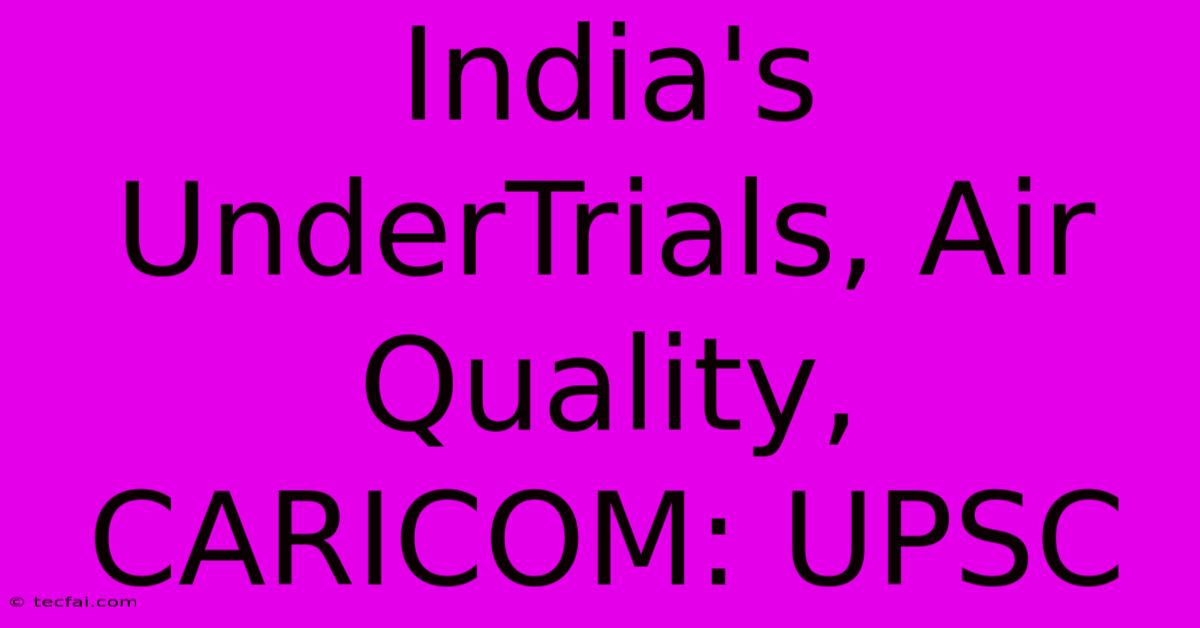India's UnderTrials, Air Quality, CARICOM: UPSC

Discover more detailed and exciting information on our website. Click the link below to start your adventure: Visit Best Website tecfai.com. Don't miss out!
Table of Contents
India's Undertrials, Air Quality, and CARICOM: A UPSC Perspective
India's diverse landscape presents a complex interplay of social, environmental, and geopolitical challenges. For aspirants preparing for the Union Public Service Commission (UPSC) examination, understanding these interconnected issues is crucial. This article delves into three distinct yet interconnected areas: the plight of undertrials in India, the deteriorating air quality, and India's relationship with the Caribbean Community (CARICOM).
India's UnderTrial Crisis: A Justice Delayed
India's staggering number of undertrials – individuals awaiting trial – represents a significant human rights concern and a systemic failure within the justice system. This issue consistently features in UPSC examinations, demanding a nuanced understanding of its causes and consequences.
-
Causes of the UnderTrial Crisis: The problem is multi-faceted, encompassing factors like:
- Inefficient judicial processes: Overburdened courts, lengthy trials, and a shortage of judges contribute significantly to delays.
- Lack of infrastructure: Inadequate prison facilities exacerbate the problem, leading to overcrowding and inhumane conditions.
- Socio-economic disparities: Poor individuals often lack access to adequate legal representation, further delaying the judicial process.
- Complex legal procedures: The intricacies of legal procedures often disadvantage the underprivileged, prolonging their incarceration.
-
Consequences of the UnderTrial Crisis: The consequences are far-reaching:
- Violation of human rights: Prolonged detention without conviction infringes upon fundamental rights.
- Social and economic repercussions: Families of undertrials face significant financial and emotional distress.
- Strain on prison systems: Overcrowded prisons lead to health issues and increased crime rates.
- Erosion of public trust: The slow pace of justice erodes public confidence in the judicial system.
-
Addressing the UnderTrial Crisis: Potential solutions include:
- Judicial reforms: Increasing the number of judges, streamlining judicial procedures, and implementing fast-track courts.
- Strengthening legal aid: Providing free and effective legal representation to underprivileged individuals.
- Improving prison infrastructure: Creating better facilities and improving the conditions for inmates.
- Alternate Dispute Resolution (ADR): Promoting mediation and arbitration to reduce the burden on courts.
Deteriorating Air Quality in India: An Environmental Emergency
Air pollution in India, particularly in metropolitan areas, poses a significant public health challenge and an environmental emergency. The UPSC often tests candidates' understanding of its sources, impacts, and potential mitigation strategies.
-
Sources of Air Pollution: The major contributors include:
- Vehicular emissions: Rapid motorization and inadequate public transport systems significantly increase pollutants.
- Industrial emissions: Industries release a substantial amount of pollutants into the atmosphere.
- Construction activities: Dust and particulate matter generated from construction projects worsen air quality.
- Burning of biomass and fossil fuels: Traditional cooking methods and the burning of agricultural waste contribute substantially to pollution.
-
Impacts of Air Pollution: The health consequences are severe:
- Respiratory illnesses: Increased instances of asthma, bronchitis, and other respiratory infections.
- Cardiovascular diseases: Air pollution is linked to heart attacks and strokes.
- Cancer: Long-term exposure to air pollutants increases the risk of several types of cancer.
- Reduced life expectancy: Air pollution contributes significantly to premature mortality.
-
Mitigation Strategies: Effective measures require a multi-pronged approach:
- Promoting cleaner transportation: Encouraging public transport, cycling, and the adoption of electric vehicles.
- Stricter emission standards: Implementing and enforcing stringent emission norms for industries and vehicles.
- Renewable energy transition: Shifting from fossil fuels to renewable energy sources.
- Afforestation and urban greening: Increasing green cover to absorb pollutants.
- Public awareness campaigns: Educating the public about the harmful effects of air pollution and promoting responsible behavior.
India and CARICOM: Expanding Geopolitical Horizons
India's engagement with CARICOM, a regional intergovernmental organization of 20 Caribbean states, is gaining significance in the context of its Act East Policy and increasing global influence. Understanding this relationship is vital for UPSC aspirants.
-
Areas of Cooperation: India collaborates with CARICOM in various areas, including:
- Trade and investment: Expanding economic ties through increased trade and investment flows.
- Capacity building: Providing technical assistance and training in various sectors.
- Development assistance: Supporting infrastructure development and social programs.
- Cultural exchange: Promoting cultural understanding and people-to-people connections.
- Climate change: Collaborating on climate change mitigation and adaptation.
-
Strategic Significance: The relationship offers mutual benefits:
- For India: Access to new markets, strengthening its presence in the Americas, and countering Chinese influence.
- For CARICOM: Access to development assistance, technology transfer, and enhanced economic opportunities.
Conclusion:
These three distinct areas – undertrials, air quality, and India's relationship with CARICOM – highlight the complexity and interconnectedness of challenges facing India. Understanding these issues and their potential solutions is crucial for any UPSC aspirant aiming to analyze India's multifaceted reality effectively. Thorough preparation, encompassing a holistic understanding of these themes and their underlying causes and consequences, is key to success.

Thank you for visiting our website wich cover about India's UnderTrials, Air Quality, CARICOM: UPSC. We hope the information provided has been useful to you. Feel free to contact us if you have any questions or need further assistance. See you next time and dont miss to bookmark.
Featured Posts
-
Harry Kane Beats Haalands Goal Pace
Nov 23, 2024
-
F1 Approves Larger Grid For Gm
Nov 23, 2024
-
Renewed Effort For Andretti In F1
Nov 23, 2024
-
Return To Paradise Full Episode Guide
Nov 23, 2024
-
Conor Mc Gregor Sexual Assault Lawsuit
Nov 23, 2024
